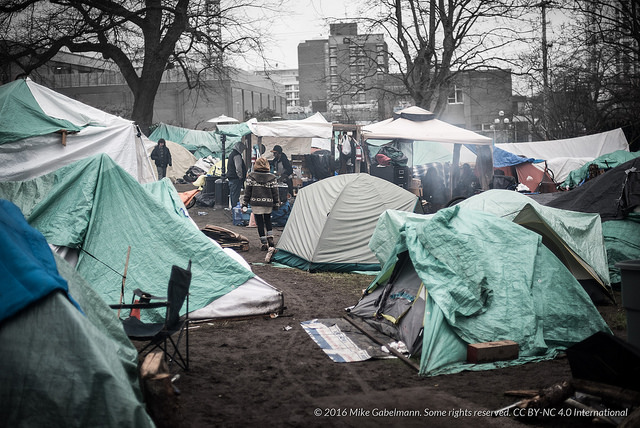Like this article? rabble is reader-supported journalism. Chip in to keep stories like these coming.
After fighting off pressures to dismantle their community for over a year, Super InTent City residents in Victoria, B.C. have been told they must leave by August 8.
The ruling was made last week in B.C.’s Supreme Court by Chief Justice Christopher Hinkson who cited greater than anticipated costs, deterioration of health, violence and criminal activity as some of the reasons for shutting it down.
“I have come to the conclusion that the Encampment is unsafe for those living there and for the neighbouring residents and businesses and cannot be permitted to continue,” he said in his decision, released on July 5. “The residents of the Encampment can no longer remain where they are pending the trial of the plaintiffs’ action against them, and the Encampment must be closed.”
As part of his decision, alternative housing options must be made available for the tent city’s residents which has put pressure on the Province to complete its conversion of the Central Care Home on Johnson Street into 140 units of supportive housing by August 8.
“I think the tent city was really effective at putting pressure on the provincial government,” Victoria City Councillor Ben Isitt told rabble. “We now have 300 new units of interim and permanent housing and we also have a provincial commitment to match the regional contribution of $30 million for new housing with supports so I think we’re closer to eliminating homelessness in the capital region than we’ve been for some time.”
According to Michele Biss, Legal Education and Outreach Coordinator at Canada Without Poverty, this increase in housing is a victory that is a testament to the hard work of the residents of Super InTent City.
“There’s a real human reality to this…the individuals we’re talking about, they’re people with dignity with families and lives and stories of their own. They’re people who deserve their rights to be recognized,” she told rabble over the phone. “In terms of the individuals who have been working so hard, living in the camp, who have been there almost a year, the fact that housing has been proposed by the government is really a testament to the resilience and strength of the individuals there. In that sense, it is a pretty huge victory.”
While there was a significant increase in housing options in Victoria over the past year as a result of Super InTent City, housing activists say there is still an overwhelming need in the region.
“Unfortunately, these new and long overdue efforts will not solve the problem in Victoria, where the depth of homelessness is far-reaching, affecting more than 1,400 people and their families,” said a Together Against Poverty Society — a legal advocacy group in Victoria — in a statement. “This is why we cannot rest until we have homes for all.”
In fact, Biss says Super InTent City highlights the need for housing across Canada, particularly with a human rights based approach.
“The government needs to move to a place where they recognize that they’re responsible for human rights obligations to those individuals,” she said.
“When you look at this from a much larger perspective, there’s a lot going on here. What happened at Super InTent is a small piece of a much larger picture…When we look at homelessness in Canada, it is a crisis. It is an emergency. We need actions, we need human rights actions.”
Biss also pointed out that the connection between health, the right to life and homelessness — one that was implied in Justice Hinkson’s stated concern for health and safety conditions in the camp — is important to consider at a national level.
“There’s a much bigger piece about how the right to life fits in with our understanding of homelessness in Canada. In British Columbia alone, there has been an increase of 70 per cent in homeless deaths between 2013 and 2014. Forty-six homeless people died in B.C. in 2014, many of which were preventable,” she said. “It needs to be understood that homelessness is a life or death issue. It’s a crisis and it’s something that we need to act on immediately.”
Two separate tent city spaces have popped up in B.C.
On July 9, 30 people established a tent city in Vancouver’s Downtown Eastside to draw attention to displacement and the lack of affordable housing in Vancouver. The group agreed to meet with Mayor Gregor Robertson at City Hall.
Also on July 9, Alliance Against Displacement began occupying a building in Burnaby, B.C. that had been slated for demolition after all residents were evicted. The group is calling on the city to end the demolition of buildings in the area.
Alyse Kotyk is a Vancouver-based writer and editor with a passion for social justice and storytelling. She studied English Literature and Global Development at Queen’s University and is excited by media that digs deep, asks questions and shares narratives. Alyse was the Editor of Servants Quarters and has written for the Queen’s News Centre, Quietly Media and the Vancouver Observer. She was rabble’s 2015-16 news intern.
Photo: flickr/Mike Gabelmann




